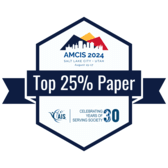Paper Type
ERF
Abstract
The Internet has transformed the landscape of healthcare information seeking, with online health communities (OHCs) allowing human-to-human sharing of information, and healthcare chatbots allowing machines to answer questions. While OHCs facilitate connections and support sharing among individuals with health concerns, healthcare chatbots utilize artificial intelligence to provide personalized assistance. This study aims to compare the efficacy of human support providers in OHCs and those of healthcare chatbots in delivering emotional support and facilitating information-seeking interactions. Using social support theory, the research compares support provision between OHCs and healthcare chatbots. We propose to pose questions to healthcare chatbots that have been asked and responded to on OHCs and then measure the informational and emotional content of chatbot-generated responses. By systematically evaluating emotional support provision and information-seeking interactions facilitated by chatbots, this study seeks to contribute valuable insights to the fields of healthcare communication and artificial intelligence in OHCs.
Paper Number
1227
Recommended Citation
Bhagat, Sarbottam; Jozani, Mohsen; Williams, Jason A.; and Aleroud, Ahmed, "AI Vs Human: Evaluating AI's Proficiency in Detecting and Responding to Informational and Emotional Health Queries" (2024). AMCIS 2024 Proceedings. 11.
https://aisel.aisnet.org/amcis2024/social_comp/social_comput/11
AI Vs Human: Evaluating AI's Proficiency in Detecting and Responding to Informational and Emotional Health Queries
The Internet has transformed the landscape of healthcare information seeking, with online health communities (OHCs) allowing human-to-human sharing of information, and healthcare chatbots allowing machines to answer questions. While OHCs facilitate connections and support sharing among individuals with health concerns, healthcare chatbots utilize artificial intelligence to provide personalized assistance. This study aims to compare the efficacy of human support providers in OHCs and those of healthcare chatbots in delivering emotional support and facilitating information-seeking interactions. Using social support theory, the research compares support provision between OHCs and healthcare chatbots. We propose to pose questions to healthcare chatbots that have been asked and responded to on OHCs and then measure the informational and emotional content of chatbot-generated responses. By systematically evaluating emotional support provision and information-seeking interactions facilitated by chatbots, this study seeks to contribute valuable insights to the fields of healthcare communication and artificial intelligence in OHCs.
When commenting on articles, please be friendly, welcoming, respectful and abide by the AIS eLibrary Discussion Thread Code of Conduct posted here.





Comments
SOCCOMP